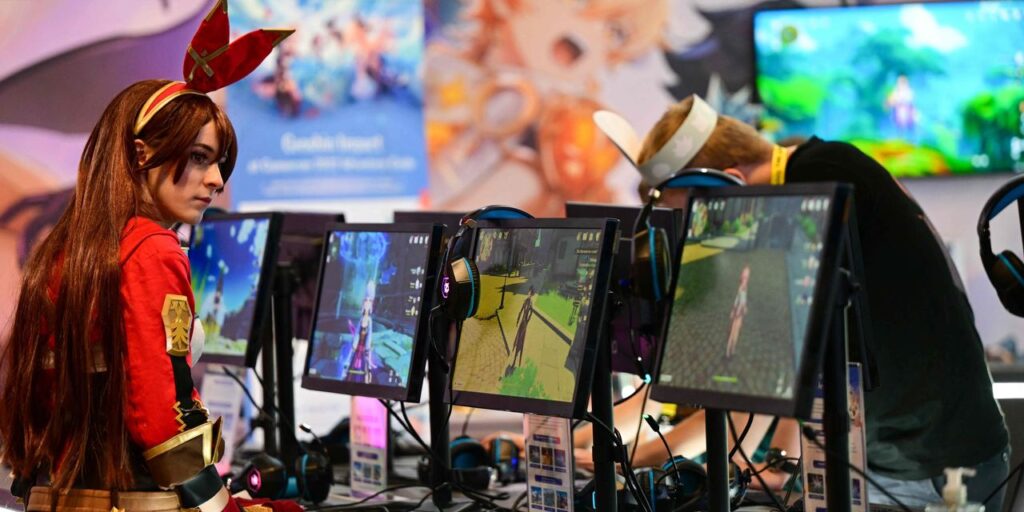The vibrant world of Japanese video games has had a profound and enduring impact on the global gaming culture. Emerging from the arcades of the 1980s, Japanese game developers have created iconic franchises that have not only defined genres but also shaped the expectations and experiences of gamers worldwide. This article delves into the historical significance, cultural exchange, and innovative spirit that Japanese games have brought to the global stage, capturing the essence of their influence in a dynamic and engaging manner.
The Rise of Japanese Video Games: A Historical Perspective
In the early 1980s, the video game industry experienced a transformative shift with the rise of Japanese game developers. Companies like Nintendo, Sega, and Capcom began to dominate the arcade and home console markets with titles that would become timeless classics. Games such as “Super Mario Bros.,” “The Legend of Zelda,” and “Street Fighter” not only showcased innovative gameplay mechanics but also introduced storytelling elements that were previously unseen in video games. These titles captivated audiences and laid the groundwork for the narrative-driven experiences that modern gamers enjoy today.
The impact of these early Japanese games cannot be overstated. Nintendo’s introduction of the Famicom (known as the NES in the West) in 1983 revolutionized home gaming, setting new standards for game design and quality. The success of the Famicom/NES was a pivotal moment that solidified Japan’s position as a leader in the gaming industry. The creativity and technical prowess displayed by Japanese developers during this era set the stage for future innovations and established a legacy that continues to inspire game creators around the world.
Cultural Exchange Through Gaming: Bridging East and West
Japanese video games have played a significant role in bridging cultural gaps between the East and the West. The localization of Japanese games for Western audiences not only made these titles accessible but also introduced Western gamers to Japanese culture, mythology, and aesthetics. Games like “Final Fantasy,” “Dragon Quest,” and “Pokémon” have become cultural phenomena, transcending their origins to become beloved franchises worldwide. The characters, settings, and storylines of these games often draw heavily from Japanese folklore and traditions, offering players a glimpse into a rich and diverse cultural heritage.
This cultural exchange has been a two-way street, with Western influences also making their way into Japanese games. The collaboration between Japanese and Western developers has resulted in hybrid titles that blend the best of both worlds, creating unique gaming experiences that appeal to a global audience. For example, the “Metal Gear Solid” series by Hideo Kojima combines Japanese storytelling techniques with Western cinematic influences, resulting in a game that is both culturally rich and universally engaging. This cross-pollination of ideas has enriched the gaming industry, fostering a sense of unity and shared passion among gamers from different backgrounds.

Innovation and Creativity: The Hallmarks of Japanese Game Design
Innovation and creativity are the hallmarks of Japanese game design, driving the industry forward with groundbreaking concepts and experiences. Japanese developers are renowned for their willingness to take risks and push the boundaries of what is possible in a video game. Titles such as “Shadow of the Colossus,” “Nier: Automata,” and “Dark Souls” are prime examples of games that challenge conventional norms and offer players deeply immersive and thought-provoking experiences. These games often explore complex themes, present unique gameplay mechanics, and create emotionally resonant narratives that leave a lasting impact on players.
The influence of Japanese innovation is evident in the adoption of new technologies and game design philosophies across the global gaming industry. The introduction of motion controls with the Nintendo Wii, the popularity of portable gaming with devices like the Game Boy and the Nintendo Switch, and the pioneering of open-world design in games like “The Legend of Zelda: Breath of the Wild” have all set new benchmarks for the industry. Japanese developers continue to inspire and challenge their peers worldwide, driving the evolution of video games as an art form and a medium for storytelling.
Conclusion
The influence of Japanese video games on global gaming culture is undeniable. From the early days of the Famicom to the latest innovations in game design, Japanese developers have consistently pushed the boundaries of what is possible, creating experiences that resonate with players around the world. The cultural exchange facilitated by these games has enriched the lives of gamers, fostering a global community united by a shared love of gaming. As the industry continues to evolve, the legacy of Japanese video games will undoubtedly remain a cornerstone of the global gaming landscape, inspiring future generations of developers and players alike.


